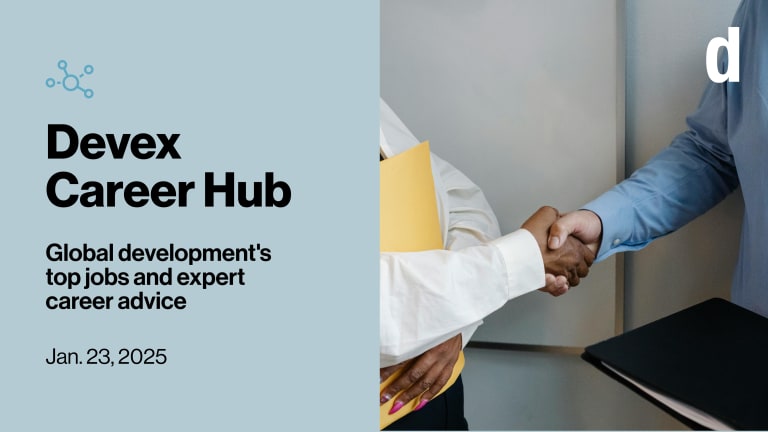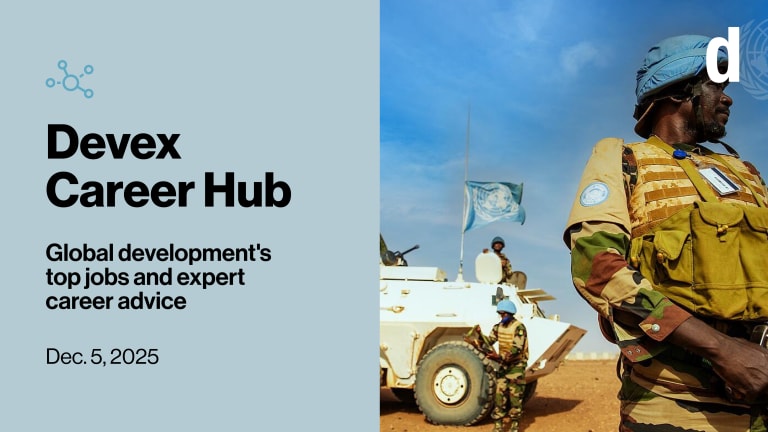Breaking into the UN: Lessons learned from experienced pros
From internships to consultancies, recruitment programs to cold applications, there are a multitude of different ways to enter the U.N.’s employ. Devex speaks to current and former workers to find out more.
Obtaining a fixed-term position at the United Nations is notoriously difficult, yet much coveted by many in the international development sector. Some are able to simply apply and secure a job but more often than not, candidates find other ways to navigate the system. That might be via an internship, recruitment program, or consultancy depending on the stage they are at in their career. “It’s a global bureaucracy and it is not the easiest to get on board,” said Mollin Luta Shaba, a lawyer from Zimbabwe who now works for the U.N.-EU Spotlight Initiative on gender-based violence in Uganda. Right now, it’s even more difficult than it may have been previously, said Chiara Frisone, a communication specialist at UNICEF’s regional office for East Asia and the Pacific, as funding is more limited and United Nations agencies look to retain the talent they have. “To apply to enter the U.N. and enter through the staff route is difficult because [they] are prioritizing more and more internal candidates to retain talent,” she said. But, speaking to Devex, a number of current and former U.N. workers shared how they were able to come into the U.N.’s employ and lay out the possible paths for potential candidates. Professional programs and internships Of those Devex spoke to, many referenced the U.N.’s entry programs designed to help early-career professionals get their start. “There are many people who start with these professional programs that are available, either being a junior professional or an internship,” said Mijail Santos Luján, communications officer at the World Health Organization. The Junior Professional Officer Programme, or JPO, is a young talent initiative designed to recruit individuals under 32 depending on their nationality, age, diploma, and years of experience. It runs alongside UNDP’s Specialist Development Programme, which targets those under 38 with at least five years of work experience in a specific field to work for two to four years. Additionally, there is the Young Professionals Programme, which looks for candidates under 32 years of age with a Master’s degree and at least four years of relevant professional experience. Each year, the U.N. issues a list of countries from which it aims to hire. Candidates from these countries must then pass an exam in a subject area that correlates with the U.N.’s at the time. “I would say do apply to all of those channels, but don’t feel that there’s something wrong with you if you don’t get the job because it’s highly competitive,” said Frisone, who began her U.N journey through the YPP program after she graduated with a degree in Latin American studies and political science in 2005. Frisone was assigned to the United Nations Programme on HIV/AIDS, or UNAIDS, in Honduras but after a year she stepped away and worked for an NGO. She then later applied to the JPO program and was deployed to South Africa with UNAIDS for three years. After another hiatus in which she established her own media consultancy, she applied for a fixed-term position with UNICEF in the Congo in 2020. Her journey highlights the value of recruitment programs but also how initially having a point of contact with the organization can help when applying for a staff position later. Aside from professional programs, the different U.N. agencies also offer internships, which can serve as “a great way to get your foot in the door,” said Eddie Wright, a media specialist with the United Nations Population Fund, or UNFPA. These help individuals get to know people and understand the potential employment opportunities within the U.N., he added. Being a UN volunteer Esperance Uwimana, a program specialist on women’s economic empowerment with UN Women, entered the U.N. after taking a United Nations Volunteers, or UNV, microfinance specialist position in Liberia. She had studied business and administration in her home country of Rwanda, before completing a master’s degree in microfinance in Italy. She then worked as a university lecturer and had roles within Rwanda’s Ministry of Finance and Economic Planning. She eventually took a second UNV position in Rwanda with UN Women. “It was my dream [to work for the U.N.]. That’s why I even accepted UNV positions,” Uwimana said, explaining that there are many benefits. “You are included in the mailing list, in staff meetings. It’s a volunteer modality, but you are also given responsibilities.” UNV, she believes, helped her to eventually secure a staff position with UN Women working on women’s economic empowerment and livelihoods in Liberia, Rwanda, Bangladesh, and Afghanistan. Taking a consultancy Elizabeth Villagomez, an economist with citizenship in Spain and Mexico, noted that many U.N. employees start their careers as consultants. These short-term roles are often easier to secure than full-time positions and, though temporary, can sometimes lead to permanent positions. That’s what happened to Shaba. She took on a gender specialist consultancy on a Malawi electoral cycle program with UNDP in 2018. “The U.N. saw the value of having me on board, and literally invited me to apply [for a fixed-term position],”, adding that she has been with UNDP since. “I had not intended to join the U.N., but sometimes you can actually be headhunted.” Villagomez’s experience was slightly different. She applied for a fixed-term position in 2001 with UNIFEM, now UN Women. At that point, she hadn’t consulted for the U.N. “I would say that only 20% to 30% of all the colleagues that I’ve known have this entry point. It’s based on your curriculum and a little bit of luck,” she said. Stepping away, she then spent several years consulting for U.N. agencies such as the International Labour Organization, UNDP, the Food and Agriculture Organization, and UNFPA in her capacity as an economist. She re-joined with a fixed-term role in 2013 but has since gone back to consulting. “There are lots of people getting consultancies, working in and around the U.N. system,” said Wright, who didn’t enter via a consultancy but joined with a fixed-term position. However, he says friends view him “as a unicorn” for not doing so. “From their perspective what I’ve done is quite unusual coming in on a fixed-term position,” he shared. Working with partner organizations Instead, Wright joined UNFPA in New York a decade ago, having worked for three years as a communications officer for an implementing partner organization — a sexual and reproductive rights NGO in Brussels. As a linguist by training, his initial aim had been to eventually work with the European Union, but instead his work with the NGO “accidentally turned me into a specialist on UNFPA’s mandate.” That meant that when a communications specialist role came up within the U.N. agency, he was well-qualified. Luján had a similar experience. Originally from Mexico, he gained his master’s in public policy in Singapore and then worked for an artificial intelligence company focused on using AI to support policymakers and other stakeholders in understanding health policy decisions. The Partnership for Maternal, Newborn & Child Health, a WHO initiative, had been one of those stakeholders. When a position came up, Luján applied, fulfilling what he shared had been a dream since attending the U.N. models in high school. Five years on, he is based in Geneva and still focused on supporting WHO in using evolving technology. “Rather than me having specific skills, it was me specializing in something I felt passionate about and combining that with the values of the organization,” he said, explaining that he works within the department of communications to tackle misinformation whilst strategizing about what, where, and to whom the agency should be communicating. Regardless of whichever route a person chooses to pursue into the U.N., Luján stressed to remain committed despite the potential rejection there may be along the way. “Be consistent, be persistent, and don’t give up easily if it’s your dream,” he said.
Obtaining a fixed-term position at the United Nations is notoriously difficult, yet much coveted by many in the international development sector. Some are able to simply apply and secure a job but more often than not, candidates find other ways to navigate the system. That might be via an internship, recruitment program, or consultancy depending on the stage they are at in their career.
“It’s a global bureaucracy and it is not the easiest to get on board,” said Mollin Luta Shaba, a lawyer from Zimbabwe who now works for the U.N.-EU Spotlight Initiative on gender-based violence in Uganda.
Right now, it’s even more difficult than it may have been previously, said Chiara Frisone, a communication specialist at UNICEF’s regional office for East Asia and the Pacific, as funding is more limited and United Nations agencies look to retain the talent they have. “To apply to enter the U.N. and enter through the staff route is difficult because [they] are prioritizing more and more internal candidates to retain talent,” she said.
This article is exclusively for Career Account members.
Unlock this article now with a 15-day free trial of a Devex Career Account. With a Career Account subscription you will get:
- Full access to our jobs board, including over 1,000 exclusive jobs
- Your Devex profile highlighted in recruiter search results
- Connections to recruiters and industry experts through online and live Devex events
Start my 15-day free trialAlready a user?
Printing articles to share with others is a breach of our terms and conditions and copyright policy. Please use the sharing options on the left side of the article. Devex Pro members may share up to 10 articles per month using the Pro share tool ( ).
Rebecca L. Root is a freelance reporter for Devex based in Bangkok. Previously senior associate & reporter, she produced news stories, video, and podcasts as well as partnership content. She has a background in finance, travel, and global development journalism and has written for a variety of publications while living and working in Bangkok, New York, London, and Barcelona.








